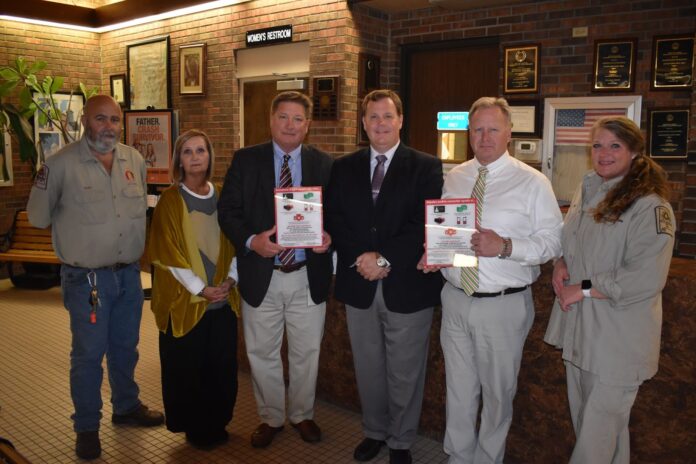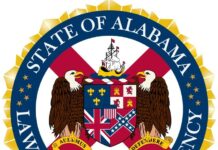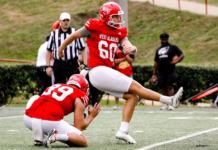
CULLMAN, Ala. – Alabama’s interstate highways are known to be among the busiest thoroughfares in the nation for human trafficking, but a coalition including the Cullman County Human Trafficking Task Force is taking a direct approach to making change. Members of the local task force on Tuesday visited Cullman County’s Interstate 65 rest stop to place signs offering advice and contact information for potential victims of human trafficking.
“Anything that we can do to make public awareness and bring to the attention of everybody the importance of human trafficking, and how it affects so many people that you would never even dream of, and it’s areas like this that the human trafficker preys on,” said Cullman County District Attorney Wilson Blaylock. “And any time that we can bring awareness, make people understand and if, in case they are a victim, that there’s help that they can call, and that’s what we encourage.”
The signage, in English and Spanish, was produced through a partnership between the task force, Junior League of Birmingham, Alabama Department of Transportation and End It Alabama. Representatives of these and other involved organizations are placing the signs at rest stops across the state.
The Junior League issued this statement:
“The Junior League of Birmingham (JLB) is pleased to announce its partnership with the Alabama Department of Transportation (ALDOT), the Cullman County Human Trafficking Task Force & End It Alabama as they aim to help victims of human trafficking in Alabama. ALDOT has granted the JLB permission to place signage in its rest stops and welcome centers throughout Alabama to engage travelers in the mission to end human trafficking and to help victims self-identify.
“‘At the JLB, it’s our mission to be leaders and changemakers in the area of human trafficking,’
said Abby Grace Worrell, chair of the JLB’s Anti-Human Trafficking Committee. ‘Our goal in
posting these signs is to help human trafficking victims self identify. Some victims grow up in
the trafficking environment and don’t recognize the signs, repetitive habits and buried childhood
mentality of sexual abuse.’
“The JLB will be placing 850 signs, both in English and Spanish, in men’s and women’s restroom
stalls across 17 ALDOT rest stops throughout the state. The signs, created by the JLB, provide
information on how to identify someone who could be in danger, as well as inform on the correct
protocols to follow if necessary.
“Human trafficking is modern-day slavery and involves the use of force, fraud or coercion to
obtain some type of labor or commercial sex act. Warning signs of trafficking, which are listed
on the stall signs, include: someone who does not have access to an ID or passport; someone who
has a boyfriend who expects them to do things for money they don’t want to; is not being paid
what his employer agreed to pay him; is not allowed to speak to friends and family; has been told
that law enforcement will not help and will deport undocumented immigrants.
“With help just a phone call or text away, the signs have important information for those that see or experience something suspicious and recommend calling 911 and the Department of Homeland Security Tipline at 866-347-2423. Those who may be in a trafficking situation should call the National Human Trafficking Resource Center Hotline at 1-888-3737-888 or text ‘HELP’ to 233733 to access help and services. Victims of human trafficking are protected under U.S. law.”
Cullman County District Judge Chad Floyd told The Tribune, “I think, when you consider what’s happening today, it’s a really practical solution to the issue. These signs are placed inside the bathrooms, inside the stalls, so they can have an opportunity to contact, to get help. A lot of times when you’re dealing with situations of human trafficking, that individual who’s being trafficked don’t get to get away from the person who’s taking advantage of them, so this is an opportunity for them to create a little space in a bathroom stall and hopefully call for assistance. I think it’s a really practical solution to this problem.”
Copyright 2021 Humble Roots, LLC. All Rights Reserved.


















